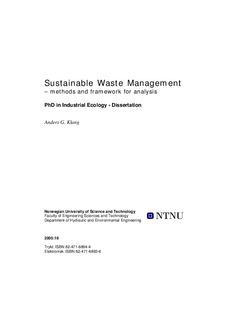| dc.contributor.author | Klang, Anders Brandén | nb_NO |
| dc.date.accessioned | 2014-12-19T12:31:08Z | |
| dc.date.available | 2014-12-19T12:31:08Z | |
| dc.date.created | 2008-04-24 | nb_NO |
| dc.date.issued | 2005 | nb_NO |
| dc.identifier | 124202 | nb_NO |
| dc.identifier.isbn | 82-471-6893-6 | nb_NO |
| dc.identifier.uri | http://hdl.handle.net/11250/242074 | |
| dc.description.abstract | Dealing with waste is a major issue in our endeavour to create a sustainable society. The purpose of this thesis is to develop a model for assessing sustainable development in waste management systems. The model should provide a valid, reliable, useful and efficient assessment tool for waste management planners. The objective has been to improve methodologies that can support decision-making processes for sustainable waste management.
The study is based on a series of case studies in which suitable indicators of sustainability aspects for different types of waste have been developed and incorporated into a model that can be used to assess the potential for sustainable development of waste management systems. Some important methodological conclusions can be drawn:
1. Municipal decision-makers prioritise both environmental and financial issues as well as social aspects when they evaluate waste management methods (Paper IV).
2. Municipal decision-makers and municipal officers consider a holistic systems approach preferable to one that is based only on costs or only on the environmental effects (Paper IV).
3. A method that includes social aspects as well as economic and environmental ones might reach different conclusions than one that only considers eco-efficiency (Paper I).
4. A systems analysis is very dependent on definitions of the complementary systems, so a thorough understanding of possible technological development is crucial for the reliability of the analysis (Paper II).
5. Methods generating results on a very aggregated level, without employing a full life-cycle perspective, or omitting one or more aspects of sustainability, are not valid for sustainable waste management decision making (Papers I, III and IV)
6. A wide-spread opinion among local decision makers and municipal officers, that national directives and objectives for waste management are poorly adapted to the conditions of sparsely populated regions (Paper IV), does not seem to find support from systems analysis using sustainable development indicators (Papers I and II).
In addition to the methodological findings, the study also reveals how different options for waste management in a sparsely populated Scandinavian region perform differently in relation to a sustainable development. The study includes solid municipal waste, wastewater and demolition waste. | nb_NO |
| dc.language | eng | nb_NO |
| dc.publisher | Fakultet for ingeniørvitenskap og teknologi | nb_NO |
| dc.relation.ispartofseries | Doktoravhandlinger ved NTNU, 1503-8181; 2005:16 | nb_NO |
| dc.relation.haspart | Klang, Anders; Vikman, Per-Åke; Brattebø, Helge. Sustainable management of demolition waste—an integrated model for the evaluation of environmental, economic and social aspects. Resources, Conservation and Recycling. 28(4): 317-334, 2003. | nb_NO |
| dc.relation.haspart | Grönlund, Erik; Klang, Anders; Falk, Stefan; Hanæus, Jörgen. Sustainability of wastewater treatment with microalgae in cold climate, evaluated with emergy and socio-ecological principles. Ecological Engineering. 22(3): 155-174, 2004. | nb_NO |
| dc.relation.haspart | Klang, Anders; Vikman, Per-Åke; Brattebø, Helge. Systems analysis as support for decision making towards sustainable municipal waste management - a case study. Waste Management & Research. 24(4): 323-331, 2006. | nb_NO |
| dc.title | Sustainable Waste Management. Methods and Framework for analysis | nb_NO |
| dc.type | Doctoral thesis | nb_NO |
| dc.contributor.department | Norges teknisk-naturvitenskapelige universitet, Fakultet for ingeniørvitenskap og teknologi, Institutt for vann- og miljøteknikk | nb_NO |
